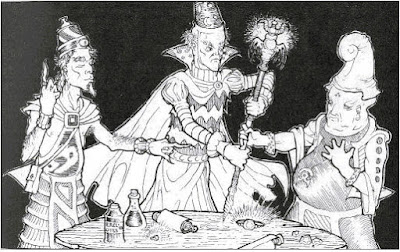The second part of this section has to do with making physical magic items. Either reproducing one listed in the books or making a brand-new one. A few guidelines are given but, even more so than with spell research, DM discretion is involved.
Unlike new spells, making a magic item requires a caster of name level. MUs, Elves, and Clerics can all create items, but clerics are somewhat more limited than the others. They can only make items that they themselves could use. Note that this is not the same as cleric-only items. Magic armor would be one example that comes to mind.
It's also worth noting that nothing says the caster has to be the only person involved in the item's creation. Perhaps a jeweler crafts the actual ring or medallion that is to be enchanted to the wizard's specifications.
Another thing to keep in mind is that acquiring the materials required are potential adventures in and of themselves. Minotaur bones, meteoric iron, or a mirror that's held a medusa's reflection are not things one can buy in town.
"These items should be difficult to obtain, and the spell caster will often have to adventure to acquire the items, for there are no magic stores."
-X51 (emphasis mine)
Side Note: I don't know that this line was intended to populate over into all facets of a BX setting, but the idea that a place to buy magic items is by default nonexistent is an interesting one. I know that I have ignored this quite frequently in order to give the players more options when it came to what to spend their money on. I am led to ponder a bit about the scope of the game and what the original intentions were, but that's a much larger topic than the one in front of us. Another time, perhaps.
Back on topic, without getting into the specifics of costs and crafting times it's important to look at them in terms of the investment they represent to the PC spellcaster. This includes money and time.
PCs creating items are going to be out of the normal day to day of the campaign for a while. They aren't going to be dungeon crawling while creating a carpet of flying or a ring of spell storing, but they may need to go on adventures ahead of time to get what they need for the task. Alternately, they may hire lower level PCs (or send apprentices) to get the goods. In fact, that is a great way to run a multi-tiered campaign: where the lower level PCs are in the employ of the higher leveled ones. Or as hooks for low level parties working for a high level NPC.
The investment of money is another factor to consider. Magic items can cost tens, if not hundreds, of thousands of gold pieces to make. The crafting PC would likely need at least one of the following ways to raise the necessary capital:
PCs creating items are going to be out of the normal day to day of the campaign for a while. They aren't going to be dungeon crawling while creating a carpet of flying or a ring of spell storing, but they may need to go on adventures ahead of time to get what they need for the task. Alternately, they may hire lower level PCs (or send apprentices) to get the goods. In fact, that is a great way to run a multi-tiered campaign: where the lower level PCs are in the employ of the higher leveled ones. Or as hooks for low level parties working for a high level NPC.
The investment of money is another factor to consider. Magic items can cost tens, if not hundreds, of thousands of gold pieces to make. The crafting PC would likely need at least one of the following ways to raise the necessary capital:
- Have saved a lot of cash from earlier adventures.
- Work for a wealthy patron. Possibly royalty or rich merchants.
- Plan on selling the item and/or take commissions.
It's also important to note that in both spell research and item creation, there is a 15% chance of failure. This is rolled after the time and money are spent! So the PC's investment is gone either way. An important factor when weighing the costs and benefits.
Finally, it's worth looking at a brief passage on X52:
A spell caster may want to use magic in a way not covered by spells or production: cleansing a defiled temple, opening a gate to another world, setting magical traps, and so on.This opens up a whole wealth of opportunities within a campaign. Perhaps that party wants to time travel back to when a lich was still a living mortal? Or travel to another plane (not something expressly covered in BX)? DMs and players alike should see this as a great opportunity to get creative and really give a campaign a distinct flavor beyond "We kill it and take its stuff!"




















